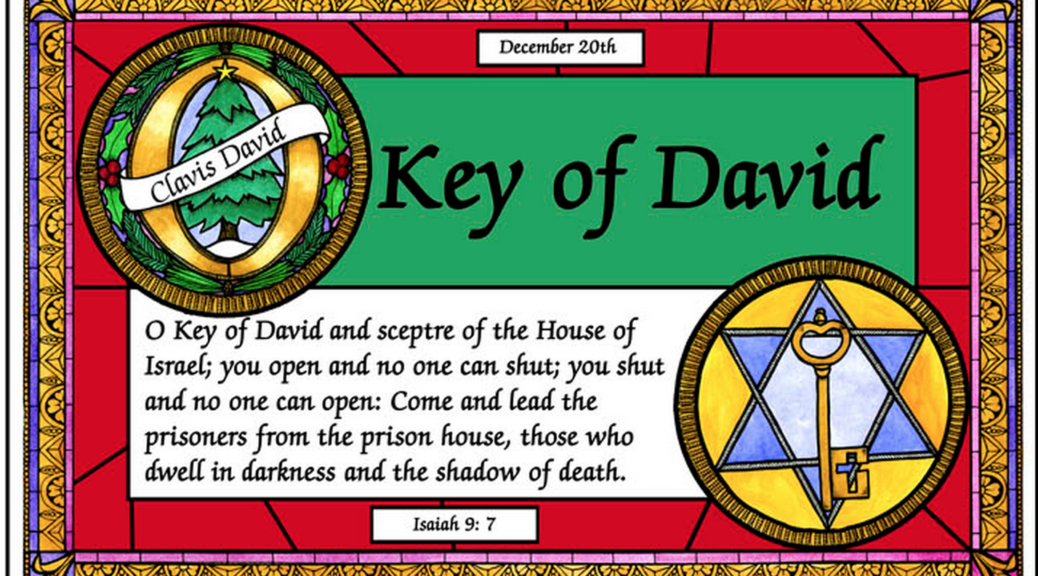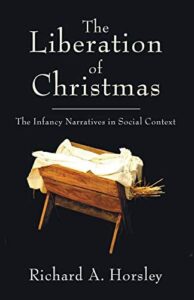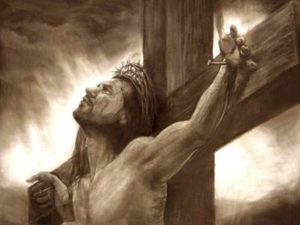One change between early Christianity and modern Christianity is that we spiritualize everything today. Consider the difference between how we sing a verse of “O Come, O Come, Emmanuel” and the way it was chanted in the early centuries:
Ancient version: “O Root of Jesse, standing as a sign among the peoples, before you kings will shut their mouths, to you the nations will make their prayer: come and deliver us, and delay no longer.”
Modern version: “O come, thou Rod of Jesse, free thine own from Satan’s tyranny; from depths of hell thy people save, and give them victory over the grave.”
Notice how the original “O Antiphons” addressed kings and the need for deliverance from political oppression, but the newer hymn addresses “Satan’s tyranny” and the need for deliverance from death. I have highlighted in previous posts how modern Christianity makes the latter need central, when more immediate needs are addressed in both the Gospels and Paul’s letters. Some of this is because we aren’t oppressed by kings anymore, and so the biblical language is less striking to us than our modern gospel tellings, which we find biblical verses (often taken out of context) to support. But we should also be aware of ways in which we who have wealth today (most people in developed nations) are more in the position of kings than in the position of the peoples crying out for help. If we don’t feel the oppression, we might just be in the position of the oppressor.
Last Christmas I had the pleasure of reading Richard Horsley’s book The Liberation of Christmas, where he notes how much of American wealth is generated by oppressive policies that funnel wealth to America while benefiting from labor performed in oppressed countries. We Americans are more in the position of Egypt than of Israel or of Rome than of Galilee. And so it is natural for us to rewrite the Christmas story, to downplay the interest in political oppression, and to spiritualize things. Consider another verse from “O Come, O Come, Emmanuel”:
Modern version: “O come, thou Key of David, come, and open wide our heavenly home. Make safe the way that leads on high, and close the path to misery. Rejoice, rejoice, Emmanuel shall come to thee, O Israel.”
The verse is about going to heaven rather than hell when you die. (Or is it when Emmanuel comes? Modern Christian chronology has trouble fitting the biblical evidence together.) Now consider the ancient version, which is again about political oppression:
Ancient version: “O Key of David and scepter of the House of Israel, you open and no one can shut; you shut and no one can open. Come and lead the prisoners from the prison house, those who dwell in darkness and the shadow of death.”
It is easy to see how the modern translator took this to be about deliverance from death, since the verse can be read as a reference to the gates of Hades, especially given the language of “the shadow of death.” But we should look at this verse more closely.
The first half of this verse quotes Revelation 3:7: “These are the words of the holy one, the true one, who has the key of David, who opens and no one will shut, who shuts and no one opens.” [All Bible quotations are taken from the New Revised Standard Version.] In Revelation this addresses Jewish Christians who have been shut out of the synagogue, and Jesus says, “I have set before you an open door, which no one is able to shut. I know that you have but little power, and yet you have kept my word and have not denied my name” (3:8). The words are addressed to the oppressed and excluded, who are about to experience “the hour of trial that is coming on the whole world to test the inhabitants of the earth” (3:10). They will be “kept” through the trial, just as they “kept” Jesus’ word (3:8).
The last line of this verse quotes from Luke 1:79, where Zechariah says that John the Baptist “will go before the Lord to prepare his ways” (1:76) and then the messiah will come “from on high” (1:78) “to give light to those who sit in darkness and in the shadow of death, to guide our feet into the way of peace” (1:79). This verse itself picks up the language of Psalm 107:10-16 (“Some sat in darkness and in the shadow of death, prisoners in affliction and in irons…. Then they cried to the LORD in their trouble, and he delivered them from their distress. He brought them out of darkness and the shadow of death and burst their bonds apart.”) The older version of “O Antiphons” recognizes that Luke 1:79 is language of being released from prison, and so the verse goes, “Come and lead the prisoners from the prison house, those who dwell in darkness and the shadow of death.”
Release of prisoners is a central idea in the Gospel of Luke. Jesus’ first sermon is about release of captives (Luke 4:16-30). He chooses Isaiah 61 as his base text: “The Spirit of the Lord is upon me, because he has anointed me to bring good news to the poor. He has sent me to proclaim release to the captives and recovery of sight to the blind, to let the oppressed go free, to proclaim the year of the Lord’s favor,” that is the Jubilee year when all who are poor and oppressed have their fortunes restored. Jesus also bases the Beatitudes and Woes (Luke 6:20-26) on Isaiah 61 and makes his fulfillment of Isaiah 61 the central evidence that he is the Coming One (Luke 7:22), that is, the rightful king (Luke 19:38), who delivers the needy (Psalm 72:1-4) .
The Christmas story in Luke 1-2 highlights ways in which Israel has been oppressed and is in need of deliverance. Luke 1:16-17 quotes Malachi in this regard. Luke 1:32-33, 35 speaks of Israel having a king again from David’s line with a never-ending kingdom. Mary’s Magnificat speaks of rulers being brought down from their thrones and the poor and hungry being cared for (1:46-56). Zechariah’s Benedictus speaks of a savior who would save Israel from its enemies (1:68-79). Luke 2:1-5 sets the birth of Jesus in the context of Roman oppression, referencing a census that had led to political revolt. Luke 2:25 speaks of “the consolation of Israel,” a reference to the political liberation prophesied in Isaiah 40:1. Luke 2:32 speaks of the return of glory to Israel in the midst of the nations. Luke 2:34 speaks of “the falling and the rising of many in Israel.” Luke 2:38 notes that people “were looking for the redemption of Jerusalem.”
In other words, the early Christians were concerned about Roman oppression of Israel and the redemption of Israel. Prisoners would be set free. Kings would be toppled. The hungry would be fed. The Christmas story is about deliverance from political oppressors. As Jesus announces at the beginning of his Sermon on the Plain, “Blessed are you who are poor, … blessed are you who are hungry now, … blessed are you who weep now” (Luke 6:20-21). The Gospel is about the exalted being humbled and the humble being exalted (Luke 14:11; 18:14). In early Christianity, the rich gave up their positions of power (Luke 19:1-10; Acts 2:45; 4:32-37), and the poor were cared for (Acts 4:34-35). The God of Israel became the God of the nations (Rev 11:15), so that people all over the world worshiped Yahweh.
These are the themes Luke associated with the Christmas story. The old “O Antiphons,” on which the hymn “O Come, O Come, Emmanuel” is based, captured some of these themes. As the hymn developed, we gradually abandoned the political ramifications of Christmas and made the whole message about what happens when you die.
This Christmas let’s remember the reason for the season: that “the hungry [might be] filled with good things” (Luke 1:53), that oppressed peoples “would be saved from [their] enemies” (1:71, 73), that we would “give light to those who sit in darkness and in the shadow of death” (1:79).
There have been times when we have remembered this. We see it in the 19th century hymn “O Holy Night,” where an abolitionist translator wrote: “Chains shall He break for the slave is our brother, and in His name all oppression shall cease.” Or even more recently, in the 1984 Christmas song, “Do They Know Its Christmas,” with its clear message:
Spare a thought this yuletide for the deprived.
If the table was turned would you survive?
Here’s to them underneath that burning sun.
You ain’t gotta feel guilt, just selfless,
Give a little help to the helpless.
Do they know it’s Christmastime at all?
Feed the world.
Feed the world.
Feed the world.
Feed the world.
Feed the world.
Let them know it’s Christmastime again.
The true way to put Christ back in Christmas is to feed the hungry, to set the oppressed free, to meet the needs of others. Let us make that our focus. Merry Christmas!




